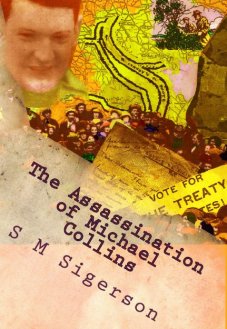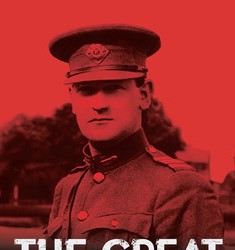Like myths, books can either illuminate facts, or obscure them. In the run-up to the Centenaries of Ireland’s War of Independence (1919-1921) & Civil War (1922-1923), the battle of ideas has begun.
Are some new books part of the same old coverup? How to tell good books from other kinds? S M Sigerson, author of “The Assassination of Michael Coliins: What Happened at Béal na mBláth?” (and of this blog) asks and answers these questions; and talks about the experience of chronicling the death of Collins.
Writing about Michael Collins tends to fall into three categories: The first (and best) is by authors whose aim is to enable the public, and future historians, to better understand what happened: by providing information, perspective, analysis, and other investigative tools. Such authors present their own opinions on the case in this context, as opinions, while encouraging further research and critique.
The second category would be by authors whose chief purpose is to focus on their own particular theory of what happened; who aim to persuade us that their theory is the right one. Whether it is or not, they, too, often unearth valuable research and raise important issues.
Within the second is a third, more suspect group, such as often crops up where politics are concerned: written with intent to discredit an individual, a political movement, etc. Created, that is, in order to obscure the facts. These may come disguised, to attract an unsuspecting public: proclaiming themselves as fearless exposés; and/or masking their intent with dulcet language of objectivity, scientific method, etc. Some have even come decorated by academic credentials from lofty institutions.
As we approach the 2022 Centenary of Michael Collins’ death, this third type of commentary has begun to rear its ugly head. Much in the style of “fake news” and outrageous fabrications with which powerful and dangerous elements have lately bombarded the public, from the highest places, such sprurious studies aim to create general confusion. Confusion which, in turn, disarms criticism and resistance. Resistance to … most questionable proceedings indeed.
Such works and the writers thereof, being otherwise beneath our notice, shall remain nameless here.
Writing about the death of Collins
What I here make public has, after a long and scrupulous inquiry, seemed to me evidently true … Whether it be so or no, I am content the reader should impartially examine. – George Berkeley
This writer came to Michael Collins’ story with a mind as nearly completely open as could be found, in anyone who cares enough to write about it at all. Not having grown up in Ireland, there was no pressure of Civil War loyalties to either side, in my background.
Nor had I any preconception whatever as to how he died. At first, I accepted the sketchy standard version which appears in most biographies of him. As my interest and acquaintance with the topic grew deeper, I gradually became dissatisfied with that version. Initially, only a little dissatisfied; until at last I grew convinced that his death had not been adequately investigated; neither at the time it happened, nor subsequently by historians.
It also became clear that Collins’ end can only be discussed intelligently, with a working understanding of both sides in the Civil War. In my own writing, I sought to present both sides, in a style digestible not only for general readers, but also for enthusiasts who might sympathize with either the pro-Treaty or anti-Treaty viewpoints: trying to give equal time to both, and letting them speak for themselves in their own words, as much as possible.
It is the practice of some more cynical commentators (described above,) to attack anyone who tries to do so, as a dangerous, wild-eyed partisan; that is, anyone who does not participate in silencing one side of the discussion.
People in Ireland are well-used to this technique; with which they have been sadly acquainted ad nauseum throughout The Troubles of the 20th century; and in the surrounding debate, ever since.
S M Sigerson’s work, obviously written from the heart, is a valuable contribution to the literature on Michael Collins and should be available in any self-respecting Irish library. – Tim Pat Coogan
I trust in the public, in future generations, and in the passage of time, to ultimately sort true from false, among conflicting claims about the life and death of Michael Collins.
I call for a full catalog and compendium of Collins’ own letters and writings, which are infinitely more valuable to history than anything that subsequent writers can say about him. Looking forward to the 2022 Centenary, I again urge all individuals and institutions holding such materials, to cooperate in realizing this, with speed.
I also repeat my call for an independent forensic examination of his remains; which could conclusively answer many points now debated in theory.
I encourage those with an interest to examine all writings about Michael Collins.
Then, you be the judge.
Read more:
“The Assassination of Michael Collins:
What Happened At Béal na mBláth?”

by
S M Sigerson
Paperback or Kindle edition here:
www.amazon.com/dp/1493784714
All other e-reader formats:
www.smashwords.com/books/view/433954
Read reviews:
http://www.rabidreaders.com/2014/12/03/assassination-michael-collins-s-m-sigerson-2/
Or ask at your local book shop
Also see:
“Studying the death of Michael Collins:
Deception, evasion, and perception”
www.academia.edu/34795377/Studying_the_death_of_Michael_Collins_1890_-_1922_.rtf

